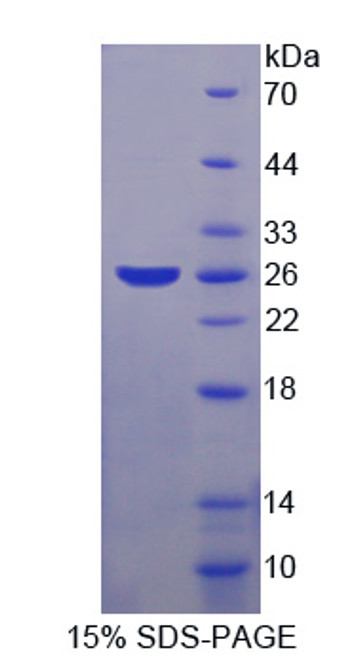Product Description
Human S-phase kinase-associated protein 1 (SKP1) ELISA Kit | AE19429HU | Abebio
Species Reactivity: Human (Homo sapiens)
Abbreviation: SKP1
Alternative Name: EMC19; MGC34403; OCP-II; OCP2; SKP1A; TCEB1L; p19A; RNA polymerase II elongation factor-like protein OCP2|cyclin A/CDK2-associated p19|organ of Corti protein 2|transcription elongation factor B (SII
Application: ELISA
Range: 0.156-10 ng/mL
Sensitivity: 0.054 ng/mL
Intra-Assay: ≤4.3%
Inter-Assay: ≤7.5%
Recovery: 0, 97
Sample Type: Serum, Plasma, Other biological fluids
Detection Method: Sandwich
Analysis Method : Quantitive
Test Principale: This assay employs a two-site sandwich ELISA to quantitate SKP1 in samples. An antibody specific for SKP1 has been pre-coated onto a microplate. Standards and samples are pipetted into the wells and anySKP1 present is bound by the immobilized antibody. After removing any unbound substances, a biotin-conjugated antibody specific for SKP1 is added to the wells. After washing, Streptavidin conjugated Horseradish Peroxidase (HRP) is added to the wells. Following a wash to remove any unbound avidin-enzyme reagent, a substrate solution is added to the wells and color develops in proportion to the amount of SKP1 bound in the initial step. The color development is stopped and the intensity of the color is measured.
Product Overview: S-phase kinase-associated protein 1 is a member of the SCF ubiquitin ligase protein complex. It binds to proteins containing an F-box motif, such as cyclin F, S-phase kinase-associated protein 2, and other regulatory proteins involved in ubiquitin dependent proteolysis. The encoded protein also collaborates with a network of proteins to control beta-catenin levels and affects the activity level of beta-catenin dependent TCF transcription factors. Studies have also characterized the protein as an RNA polymerase II elongation factor. Alternative splicing of this gene results in two transcript variants. A related pseudogene has been identified on chromosome 7.
Stability: The stability of ELISA kit is determined by the loss rate of activity. The loss rate of this kit is less than 5% within the expiration date under appropriate storage condition. The loss rate was determined by accelerated thermal degradation test. Keep the kit at 37°C for 4 and 7 days, and compare O.D.values of the kit kept at 37°C with that of at recommended temperature. (referring from China Biological Products Standard, which was calculated by the Arrhenius equation. For ELISA kit, 4 days storage at 37°C can be considered as 6 months at 2 - 8°C, which means 7 days at 37°C equaling 12 months at 2 - 8°C) .
 Euro
Euro
 USD
USD
 British Pound
British Pound
 NULL
NULL












